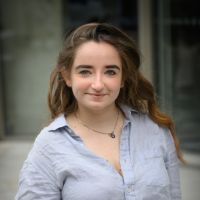5 min read
We sat down with Clem, who took IR209: International Political Economy: States and Markets in the 21st Century in 2023, to hear what she learnt from the course and how it will help her in her future goals.
Why did you decide to attend LSE Summer School?
I decided to attend the LSE Summer School partly to confirm my interest in the field of international relations, a path I would like to follow for my postgraduate studies, at one of the top universities in the field. The other reason I attended was to take advantage of the professional opportunities that LSE Summer School has to offer, all in a very cosmopolitan atmosphere.
Why did you choose IR209?
I chose IR209 because, as a student of public law wishing to work in an international organisation, I wanted to broaden my field of expertise in international relations, and more specifically in the international political economy. I wanted to study a variety of topics (Covid-19, Sino-American relations, central banking, environmental issues...) from the perspective of the international political economy, from experts in the field.
Tell us about an average day as a student on IR209.
A normal day as a student on this course is very fast-paced but exciting!
For me, I'd get up around 8am to do some sport, then have class from 10am to 1pm. The morning classes were my lectures, but were still very interactive and at a reasonable pace.
After lunch with friends, I followed this up with 1.5 hours of seminars in the afternoon. This was an opportunity to exchange ideas with the other students on the concepts we had studied, to go into greater depth and to debate.
To be able to take full advantage of the courses, we were advised to work 3 hours a night, to review the concepts and do the readings.
The end of the day was often a dinner with friends in the heart of London, or a night out!
What was your favourite part of IR209?
My favourite aspect of this course was the diversity of topics covered: 12 in total, ranging from the global economic order to central banking, climate change, Covid-19 and Brexit!
I also particularly appreciated the fact that the course was not just an introduction, but gave us real in-depth teaching, enabling us to determine our opinion and critical thoughts afterwards.
What advice would you give to students considering IR209?
My advice to students wishing to take IR209 would be to have a grounding in economics, or at least to be familiar with some introductory texts on international political economy.
In addition, I'd say it's also important to prepare for the intensity of the courses, to develop the habit of having long readings every day.
Finally, if you take this course, take every possible opportunity to hand in your work, participate in presentations etc. to get feedback on your work and find your areas for improvement.
What are your short-term professional goals?
My short-term professional goal is to secure an internship in an international organisation working on environmental issues or public policy financing.
To help me make this a reality, I was able to gather advice from all my teachers at LSE Summer School.
What would be your top tip for future Summer School students?
My advice to LSE Summer School students would be to get out of your comfort zone! This experience is unique, and realising this will help you to push your boundaries.
Every interaction is valuable and can be a learning opportunity, whether academic or professional.
What was your favourite part of studying at LSE?
In addition to the academic rigor required, my favourite part of studying at LSE was the environment! Everything is designed for student success!
First of all, there are many different places to study on campus, so you're bound to find one to your liking: from the quiet of the library to the comfort of the top floor of the Centre Building or the buzz of the Marshall Building.
In addition, LSE offers a wide range of facilities: group work rooms, a gym and, of course, the indispensable library.
How did you find the British teaching style?
This is a big question for a French student! I absolutely fell in love with the British teaching style, which I discovered at LSE.
First of all, as far as the teachers were concerned, I wasn't expecting them to be so caring! The teachers take the time to make sure we understand and to explain their expectations of us. We were also encouraged to discuss topics and openly debate. The lecturers are full of good advice on how to succeed and are only too happy to share it with us.
Secondly, as a French law student, I'm often confronted with a lot of learning by memorisation, so being given the concepts in order to make up my own mind was a revelation!

